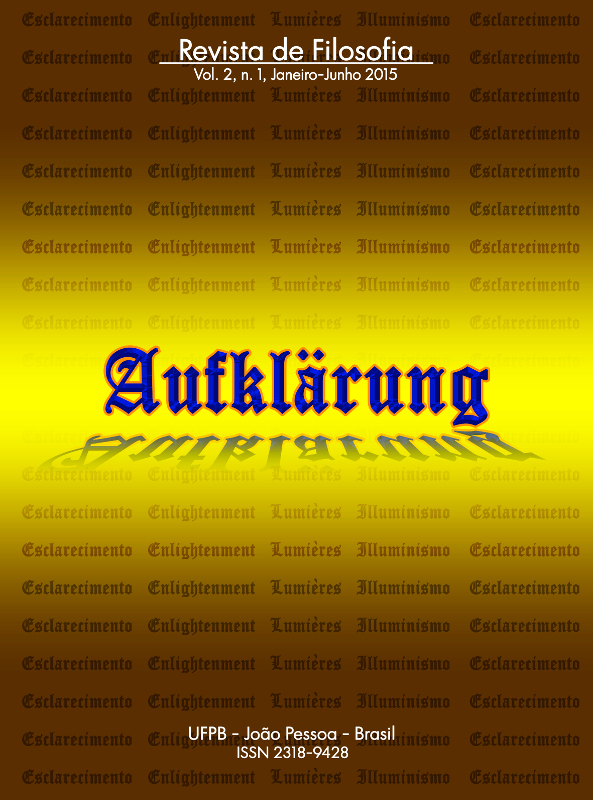Justice And Law In Hegel: The Way Of Atonement And The Way Of Healing
DOI:
https://doi.org/10.18012/arf.2016.22863Keywords:
Hegel, Kant, way of healing, via the atonement, worth itAbstract
There are two theories on hegelian philosophy to justify the punishment: the way of atonement and the way of healing. The route of the atonement of the agent of punishment and states that the responsibility for the crime is the criminal. This pathway is concerned essentially with the duty and the rules. Hegel differs from kantian retributivista position because, according to Kant, the penalty is an ethical necessity (categorical imperative) and Hegel, the penalty is a logical necessity (denial of crime and affirmation of the sentence). Kant remains attached to the subjectivity; Hegel overcomes it through an objective explanation of criminal law. Have the path of healing part of the punishment and patient advocates that the punishment is a right of the criminal. Thus, the duty is secondary and the punishment is seen as suffering from the generator.Downloads
References
BITENCOURT, Cezar Roberto. Tratado de Direito Penal. Parte Geral 1. São Paulo: Saraiva, 2007.
BOBBIO, Norberto. Estudos sobre Hegel. Direito, Sociedade Civil, Estado. 2. ed. São Paulo: Brasiliense/UNESP, 1991.
GADAMER, Hans-Georg. Hegel, Husserl, Heidegger. Rio de Janeiro: Vozes, 2012.
HABERMAS, Jürgen. Comentários à ética do discurso. Lisboa: Piaget, 1991.
HEGEL, G. W. F. Filosofia Real. México: Fundo de Cultura Econômica, 1984.
______. Princípios da filosofia do direito. São Paulo: Martins Fontes, 1997.
______. Sobre as maneiras científicas de tratar o direito natural. Trad. de Agemir Bavaresco e Sérgio B. Christino. São Paulo: Loyola, 2007.
HONNETH, Axel. Luta por reconhecimento. A gramática moral dos conflitos sociais. Trad. de Luiz Repa. São Paulo: Ed. 34, 2003.
INGRAM, D. Filosofia do direito. Porto Alegre: Artmed, 2010.
INWOOD, Michael. Dicionário Hegel. Trad. Álvaro Cabral. Rio de Janeiro: Jorge Zahar Editor, 1997.
MARQUES, L. A. M. “Retributivismo”. Dicionário de Teoria e Filosofia do Direito. Travessoni, A. (Org.). São Paulo: LTr, 2011.
MERLE, Jean-Christophe. “Pena”. Dicionário de Teoria e Filosofia do Direito. Travessoni, A. (Org.). São Paulo: LTr, 2011.
MÜLLER, Rudinei. A crítica de Hegel ao formalismo kantiano. O argumento especulativo. São Leopoldo: Ed. UNISINOS, 2012.
RAWLS, J. História da filosofia moral. São Paulo: Martins Fontes, 2005.
RAUBER, J. O problema da universalização em ética. Porto Alegre: EDIPUCRS, 1999.
ROSENFIELD, D. Política e liberdade em Hegel. São Paulo: Ática, 1995.
SALVADORI, M. Luta por reconhecimento: a gramática moral dos conflitos sociais. Resenha. Conjectura: filosofia e educação / UCS. v. 16. n. 1 (jan./abr. 2011). – Caxias do Sul, RS: Educs, 2011.
SANTOS, José Henrique. O trabalho do negativo. São Paulo, Loyola, 2007.
WOOD, A. Hegel’s Ethical Thought. Cambridge University Press, 1990.
Additional Files
Published
How to Cite
Issue
Section
License
Journal general policy
1.This journal works under a Creative Commons License aplied to online journals. That icence can be read in the following link: Creative Commons Attribution 4.0 International (CC BY 4.0).
2.Accordingly to this License, a)the journal declares that authors hold the copyright of their articles without restrictions, and they can archieve them as post-print elsewhere. b)the journal allow the author(s) to retain publishing rights without restrictions.
Metadata Policy for information describing items in the repository
1. Anyone may access the metadata free of charge at anytime.
2.The metadata may be re-used in any medium without prior permission, even commercial purposes provided the OAI Identifier or a link to the original metadata record are given, under the terms of a CC BY license refered for the Journal.







































